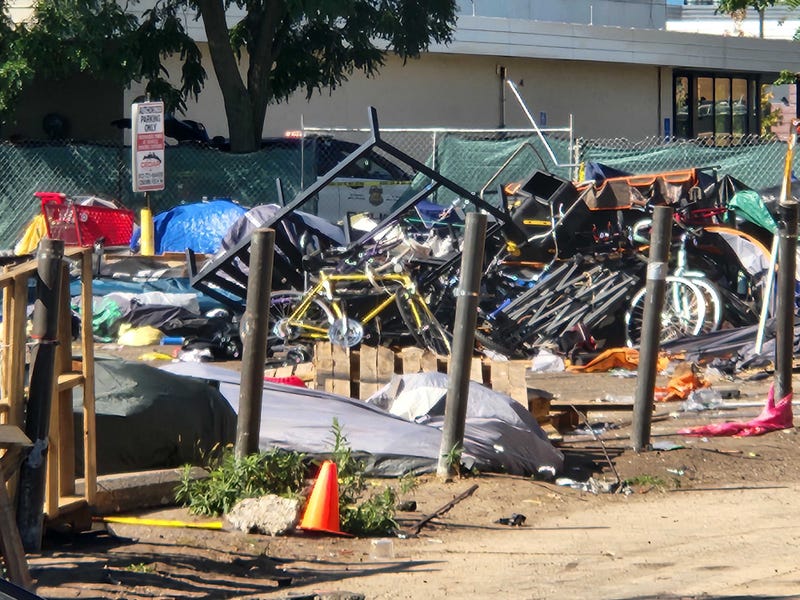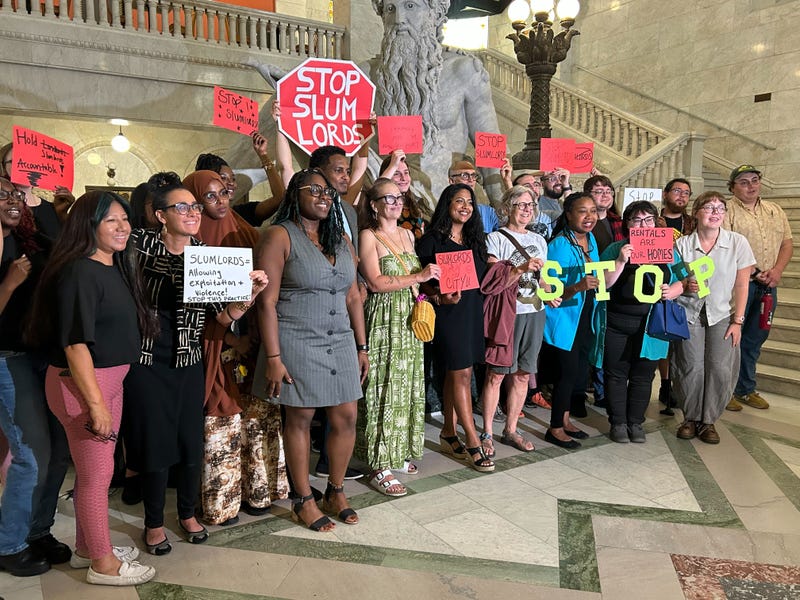
City workers are busy clearing out a Minneapolis encampment where eight people were injured as a mass shooting overnight.
Dressed in bright yellow jumpsuits, those workers began the task late Tuesday morning. There is one large dumpster on the site and two trucks to haul things away, along with workers picking up tarps and wooden pallets.
They also are using wide shovels to scrape the pavement of anything small that's leftover.
The shooting at the encampment was the second in less than 24 hours in areas city leaders and police had become concerned about, with rampant drug use and unhealthy, dirty conditions.
That has city eaders weighing in on what's next. Hennepin County Sheriff Dawanna Witt told WCCO Radio's Adam and Jordana that Minneapolis encampments have reached a tipping point.
"We've heard people talk about it over and over again from, from the mayor to the chief about all of the activity that has been going on there. We should not be tolerating that," says Witt.
The sheriff says people living in encampments are often rejecting resources offered to help get them out of that environment, and that many are benefiting the from keeping these encampments open.
"Whether it's a trafficker, drug trafficker, sex traffic, it's a vulnerable community and there's a cesspool for these people who have no intentions but making a living off of those vulnerable communities," Witt explains.
That encampment has been at the center of a dispute for months, with the city wanting to close it and the landlord refusing to do so. The parking lot where the encampment was set up is on private property and is owned by Hamoudi Sabri, who has criticized the City over its approach towards encampments.
"I know it's been a lot of violence lately," said MPD chief Brian O'Hara. "And we just want our community to know that we are not going to give up, and that we will continue to fight so that every person in this city can be safe."
Minneapolis Mayor Jacob Frey says the city will be closing it, and the owner is welcome to try and sue the city if he feels like doing so.
"Equivocation on this issue is unconscionable. Whether you’re a private property owner or an elected official, the time for hedging is over," wrote Frey on social media. "We have years of evidence showing that encampments are unsafe. They don’t just endanger residents; they create conditions where some of our most vulnerable neighbors are exploited by drugs, violence, and trafficking. They regularly end with violence, fire, or tragedy. That is why we close them."
Frey says he's asked Governor Tim Walz for additional law enforcement in the form of state troopers to assist Minneapolis police officers throughout south Minneapolis neighborhoods in light of this recent violence.
"These encampments regularly end with tragedy, with shootings, with fires, and preventable deaths," said the mayor. "That is why we close them. That is why we tried to close this encampment on several occasions. It's horrific, it is tragic, but it is entirely unsurprising."
"Those are the criminals, are the people who are continuing to allow that activity going on all to put money in their own pockets, and I do mean the drug dealers and the traffickers. It's not OK," Sheriff Witt adds.
Neighbors cheer the clearing of the encampment
The encampment, in the area of South 28th Avenue and East Lake Street, is particularly grating to neighbors. Arlene Escandey lives nearby and says the spot had been a source of crime, unsanitary conditions, and drug activity.
"Some said that they wanted to be out here, they didn't want no no curfews, they didn't want nobody to tell them what to do," Escandey told WCCO Radio. "They had family, but they didn't want to go to none of their families. They would rather live out here on the streets."
Escandey says she's happy to see the city clearing out the lot.
"I don't want to see people homeless, but it's got to be a better solution and it was, you know, it looked like a circus when I was coming down Lake Street," she adds.
Five others were injured in another Minneapolis encampment shooting just hours before Monday night's shooting. That one took place on a walkway from the Transit Center on 35W and Lake Street, about two miles west of the other encampment.
The motive for that shooting is not known but O'Hara and Frey both stressed the need to shut down part of a walkway, with O'Hara saying dozens of people congregate at all hours of the day and has been a spot of concern for police.
"This walkway has been terrible, as I'm sure anyone who lives down here has been through here can tell you," O'Hara explains. "It's a whole lot of people congregating that are using drugs, it's all kinds of garbage and debris, and then we believe that this disorder is contributing to other problems that the community has been experiencing."
Council Members call for more proactive assistance from the city

Meanwhile, the Minneapolis City Council is pushing for action - not displacement - following the encampment clearing. A group of council members expressed a unified call for proactive.
Councilmember Aurin Chowdhury says the city and county always had the ability to intervene and it shouldn’t have come to this point.
"We could have talked to people, and built relationships, and said you cannot stay here because it is not safe for you, it is not safe for the neighbors in the area, it is certainly not safe for the children in the area," Chowdhury said. "It did not need to sit there for what I believe is about 68 days. There are always steps we can take."
This comes as the council was bringing attention to the STOP Slumlords ordinance, a policy to hold landlords accountable for substandard housing, which faces a committee vote on September 30.
Council members emphasized that both these issues stem from a failure to address systemic housing and health problems, and criticized the city's response saying something should’ve been done sooner.
We're setting up a disaster for our community," says Council member Jamal Osman. "Our council job is allocate resources and help those folks that need help. To enforce, work with other government agencies. It falls under the mayor's jurisdiction."
Osman added that the city code is clear that any encampments, even on private property, are illegal.
